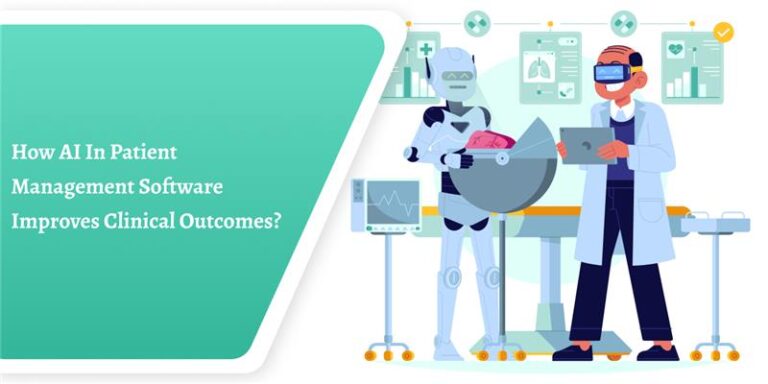Efficiency, precision, and personalization are the success mantras in providing quality healthcare in today’s healthcare environment. Patient Management Software-based Artificial Intelligence is at the forefront here. With the integration of advanced technology, Artificial Intelligence in patient management software improves decision-making, minimizes overheads, and above all, improves clinical outcomes.
Is it simplifying appointment scheduling, handling massive volumes of information in the form of patient record software, or patient engagement, an AI-based patient management system software is redefining the clinic and hospital sector. Is it influencing patient outcomes? Let us know the five best areas that are vital to healthcare success.
1. Health Care Software Competence – Intelligent Patient Choices
AI algorithm-based Patient Management Software makes faster, better-educated decisions based on years of patient history and treatment information. They are not computer file cabinets; they are intelligent machines capable of anticipating possible complications and providing evidence-based guidance for treatment.
With the help of AI, doctor-patient management software can perform real-time symptom screening, laboratory testing, and history to enable physicians to detect at-risk patients at an early stage. AI-based decision support in doctor-patient management software prevents diagnostic errors and assists in preventive care planning.
In addition to this, AI offers patient software in the guise of voice or free-text data entry functionality, and still allows users to enjoy the benefits of quality and structured patient records software.
2. Personalized Feature Integration Capabilities – One-to-One Care at Scale
One of the biggest advantages of AI patient management system software is one-to-one custom-fit integration based on a health center’s requirements. From telemedicine platforms to real-time analytics dashboards, AI empowers highly customized, scalable models of care.
Patient engagement platform companies are developing computer programs that track patient activity, medication compliance, and post-acute recovery via cell phone apps and wearable monitors. The app prompts users and physicians with reminders and tailored care with alarms.
Dynamic individualization in top patient management software decreases follow-up care and compliance, readmission, and improves outcomes.
Artificial intelligence patient care software can risk-stratify patients and personalize communication strategies in real-time, a goldmine for chronic disease management. Diabetes, hypertension, or mental illness—precision care planning is child’s play with AI through effective analysis and learning patient management systems.
3. Cost-Efficiency and Flexibility – Carving Outcomes Without Decompensating the Budget
New drugs need to be cost-efficient yet not a nuisance to costs. Patient management with AI provides reliable cost-effectiveness and quality at the same time. In eliminating drudgery, such as tedious clerical work—appointment reminders, billing service, or insurance authorization—AI frees staff from drudgery so they can provide more meaningful patient care.
All that economy and flexibility even make it possible for small rural clinics to use smart patient management software development without giant IT departments. The scheduler programs are AI-independent, cut no-shows, and optimize utilization. Human and technical capacities are optimized in an attempt to conserve on cost, as well as optimize clinical throughput so treatment is provided to patients on time.
From appointment scheduling to resource planning, AI deployment on patient record systems introduces novel patient flow and delivery service innovations with measurable impacts on enhanced clinical outcomes.
4. Quality, Support, and Security – Secure, Reliable, and Scalable Care
Security and trustworthiness are of the highest importance in healthcare. The AI patient care system has implemented encryption, access controls, and continuous monitoring to maintain the security of the information of the patients at all times. The systems are kept up to date to keep up with evolving healthcare legislations, including HIPAA and GDPR.
Other than that, AI promotes patient administration system data integrity and consistency in a way that the latest and most up-to-date patient information is available to physicians all the time.
Support. Solutions such as AI-based chatbots or patient software virtual care assistants offer 24/7 support that is personalized for patient satisfaction and engagement growth, too. Clinicians receive intelligent reminders and notifications with doctor-patient management software, compliant and long-term with best clinical practice.
Overall, such protection and support capability is akin to safe, reliable care delivery, leading to patient confidence and outcomes.
5. Good Track Record – Real-World Evidence of Impact on Clinical Outcomes
There are hardly any patient engagement software firms that have had real-world evidence of the impact on clinical outcomes. Reduced hospital readmission rates for better chronic care management and shorter recovery times, clinical benefits can be measured.
These hospitals, employing Electronic Patient Management System with AI, have better quality documentation, increased patient satisfaction, and reduced emergency ward visits. AI, as an aside, avoids complications and unnecessary interventions because it can identify the earliest signs of unstable patients through real-time monitoring systems.
The patient administration software program also allows clinicians to monitor trends by treatment plan, condition, or demographics. The learning and adaptation process continues to build intelligent care pathways over historical patient behavior and ongoing patient behavior.
With more patient records software predictive patient records, clinicians are well-positioned to intervene early before the game is on, optimizing short- and long-term health outcomes.
Conclusion: The Future of Patient Management Software Lies in AI
A glimpse into the future of AI and Patient Management Software integration is not a trend—it’s an evolution towards better clinical care. With augmented decision-making and patient-specific treatment plans, cost containment, and patient activation, AI allows health systems to deliver higher-value care, safely and effectively.
Through improved patient management system performance, patient record management systems accuracy, and dynamic opportunity creation through patient engagement software companies, AI improves the capability of healthcare organizations to provide the best.
With medicine not much behind, only those that embrace AI-based patient management software will be the ones providing maximum clinical excellence and patient satisfaction. If ever you need to know what patient management is or where to access the best patient management software for your enterprise, now’s the time to learn more about AI integration as the next step towards even better outcomes.



